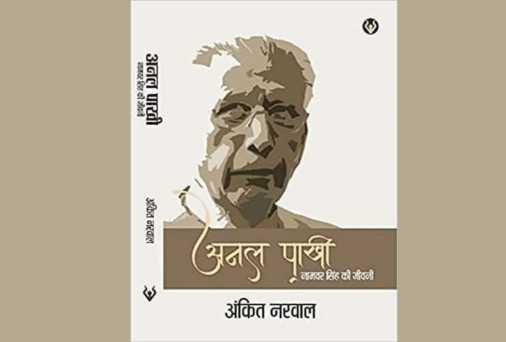Namvar’s Biography Mired into Controversy
Publishers withdraw Namvar’s biography due to controversies
Ankit Narwal, a young critic of Hindi, wrote the biography of Namvar ji ‘Anal Pakhi’ with his efforts. He was writing this biography for the last three years and only two years after the death of Namvar ji, this biography came to the fore. Ankit Narwal is the famous Kannada writer UR. He has also written a biography of Ananthamurthy and has received the ‘Yuva Sahitya Akademi’ award on this biography. But did he do ‘justice’ to Namvar Singh in this biography and sum up his entire ‘personality’ and ‘kritiva’? Some facts are wrong in this and some things have been hidden. However, there are some such things which the common reader of Hindi generally does not know or knows very little. Controversy arose, the publisher has not only withdrawn the book, but Rajkamal Prakashan has also withdrawn its first printed book, on the basis of which some wrong facts were printed in it.
In this biography, edited by Namvar ji’s son and published by Rajkamal, in the book ‘Aamne Samne’, it is claimed that Namvar ji was once associated with Rashtriya Swayamsevak Sangh and Mahatma Gandhi’s When the murder took place, Namvar ji was also arrested in the custody of the people of the Sangh Parivar. He had to spend 3 months in Pune and Lucknow jails. When he was released from jail, Atal Bihari Vajpayee had also welcomed him at the gate of the jail in his honor but a book by Mahapandit Rahul Sankrityayan changed his life and he turned from Sanghi to Marxist. But the fact is opposite.
When there was a controversy in the social media about Namvar ji ever being in the Sangh, Shri Tripathi refuted this fact and said that this confusion arose due to false publications about Namvar ji. Actually he (Shri Tripathi) was in the Sangh and went to jail. But there are many other episodes in the biography.
The author made the main basis for the special issues of various magazines published on Namvar ji, memoirs, books, articles and his interviews published from time to time on Namvar ji. Apart from this, efforts have been made to know his personality through conversations with the family members of Namvar ji, his well-wishers and his intimate friends, but till now many magazines like Pahal, Vasudha, Pakhi, Plural, Interview have come out with special issues on Namvar. A lot had been known in me, but much was still unknown. Namvar ji was known a few years ago from books like ‘JNU Mein Namvar Singh’ edited by Suman Kesari and books written by Sudish Pachauri and Bharat Yayawar. But by collecting all the facts in this book, it has been given a form of biography.
Another major event in Namvar ji’s life was that in 1947, Nirala had also given him the Young Poet Award on one of his poems, but later on, Namvar ji left the path of poetry and took the path of criticism and his first collection of poetry remained unpublished. left. After turning from poetry to criticism, a post by Kishori Das Vajpayee became a source of inspiration for him. In that verse, Kishori Das ji had written about ‘sweeping the garbage’. Namvar ji liked this and he adopted the field of criticism to remove this ‘garbage’ spread in literature and kept doing ‘cleaning’ in literature throughout his life. His book Chhayavaad established him in the world of criticism, which he wrote at the age of 29. This was the miracle of Namvar ji’s unique talent. He developed a misconception about Chhayavad from the establishments of Ramchandra Shukla and Nanddulare Vajpayee and linked it to the national movement. This establishment of his got him recognition in literature but before that his book ‘Baklam Khud’ had come.
Namvar ji may have been a student of Hindi literature, but his deep interest remained in Sanskrit literature, world literature, English criticism, history, political science and philosophy. He always tried to look at things from a historical and world point of view. He developed a vision in literature that the critics before him did not have. He was the first intellectual of Hindi who saw, known and tested literature and society with a mixed view of history, philosophy, politics, sociology, culture and art. He neither completely rejected nor completely assimilated the tradition. Similarly he did not fully assimilate nor reject modernity, but always maintained a critical outlook with it. He continued to consider Tulsi as a great poet, but he also underlined the importance of Kabir. Both Muktibodh and Ajneya were dear to him. However, his relationship with Agyeya had its ups and downs.
But he always opposed the orthodox views of the right wing in literature and took constant front from the Rupists, Kalvadis and Rus theorists. In the ‘Naya Paradigm of Poetry’, Dr. Nagendra had a long cross-examination against the ‘Rasa Siddhanta’. Actually Namvar ji was a supporter of the stream of Nirala, Shamsher, Trilochan, Nagarjuna, Muktibodh and Raghuveer Sahay. Biography shows that he was in favor of Muktibodh being given the Sahitya Akademi Award and also suggested it to his mentor Hazari Prasad Dwivedi, who was the convener of the Academy’s Hindi Paramarsh Samiti, but Dwivedi gave his book to Dr. Nagendra instead of Muktibodh. Gave Sahitya Akademi Award for ‘Rasa Siddhanta’ in 1965 and in this work Bharat Bhushan Aggarwal, the then Secretary of the Academy and poet of Tar Saptak became associate. In fact, it was Dr Nagendra who got Dwivedi ji a job in Chandigarh University.
The result of this was that Namvar ji continued to taunt Bharat ji for this. One day Bharat ji jokingly said to Namvar ji, “Say, I should get you the Sahitya Akademi Award.” He received the Sahitya Akademi Award before Guru. In this biography these facts have been hidden that Namvar ji celebrated his 75th birthday in the presence of Digvijay Singh, which was criticized. He was honored by Rajnath Singh on his 90th birthday and, despite being critical of Prime Minister Narendra Modi, addressed the Jnanpith award ceremony on stage with him. The intention of the biographer behind this is not understood. The biggest drawback of biography is that it does not have footnotes. It is not known from whom, when, where and in what context the things mentioned in the biography have been said. But the general reader gets a blueprint about Namvar ji’s life and this book can be a base material for future researchers as the abstract has been collected in one place.



